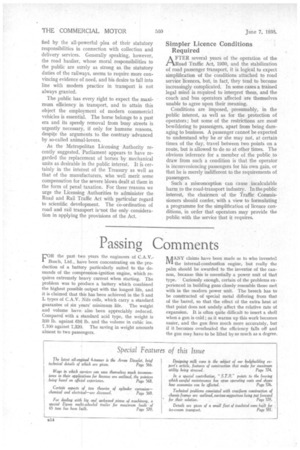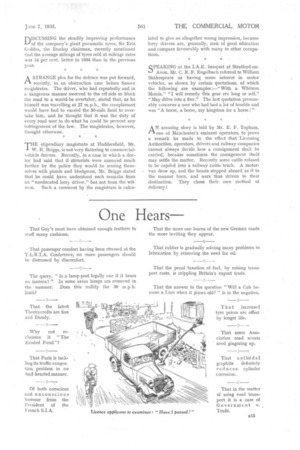Passing Comments
Page 28

Page 29

If you've noticed an error in this article please click here to report it so we can fix it.
FOR the past two years the engineers of Bosch, Ltd., have been concentrating on the pro
duction of a battery particularly suited to the demands of the compression-ignition engine, which requires extremely heavy current when starting. The problem was to produce a battery which combined the highest possible output with the longest life, and it is claimed that this has been achieved in the S and L types of C.A.V. Nife cells, which carry a standard guarantee of six years' minimum life. The weight and volume have also been appreciably reduced. Compared with a standard acid type, the weight is 360 lb. against 616 lb. and the volume in cubic ins. 7,100 against 7,320. The saving in weight amounts almost to two passengers.
h/TANY claims have been made as to who invented "1 the internal-combustion engine, but really the palm should be awarded to the inventor of the cannon, because this is essentially a power unit of that type. Curiously enough, certain of the problems experienced in building guns closely resemble those met with in the modern power unit. The breech has to be constructed of special metal differing from that of the barrel, so that the effect of the extra heat at that point does not unduly affect the relative rate of expansion. It is often quite difficult to insert a shell when a gun is cold ; as it warms up this work becomes easier, and the gun fires much more accurately, but if it becomes overheated the efficiency falls off and the gun may have to be lifted by as much as a degree. nISCUSSINGthe steadily improving performance L/ 0j the company's giant pneumatic tyres, Sir Eric Geddes, the Dunlop chairman, recently mentioned that the average mileage of tyres sold at mileage rates was 14 per cent, better in 1934 than in the previous year.
ASTRANGE plea for the defence was put forward, recently, in an obstruction case before Sussex magistrates. The driver, who had repeatedly and in a dangerous manner swerved to the off side to Nock the road to a would-be overtaker, stated that, as he himself was travelling, at 27 :m.p.h., the complainant would have had to exceed the 30-mile limit to overtake him, and he thought that it was the duty of every road user to do what he could be prevent any infringement of the law. The magistrates, however, thought otherwise.
THE stipendiary magistrate at Huddersfield, Mr. W. R. Briggs, is not very flattering to commercialvehicle drivers. Recently, in a case in which a doctor had said that if ntotorists were annoyed much further by the police they would be arming themselves with pistols and bludgeons, Mr. Briggs stated that he could have understood such remarks from an "uneducated lorry driver," but not from the witness. Such a comment by the magistrate is calcu
lated to give an altogether wrong impression, because lorry drivers are, generally, men of good education and compare favourably with many in other occupations.
QPEAKING at the I.A.E. banquet at Stratford-on}--" Avon, Mr. C. R. F. Engelbach referred to William Shakespeare as having some interest in motor vehicles, as shown by certain quotations, of which the following are examples :—" With a Whitsun Morris," "I will remedy this gear ere long or sell," "May drive into a fine." The last quotation presumably concerns a user who had had a lot of trouble and was "A horse, a horse, my kingdom for a horse :"
AN amusing story is told by Mr. E. F. Topha,m, one of Manchester's eminent operators, to prove a remark he made to the effect that Licensing Authorities, operators, drivers and railway companies cannot always decide how a consignment shall be carried, because sometimes the consignment itself may settle the matter. Recently some cattle refused to be cajoled into a railway cattle truck. A motorvan drew up, and the beasts stepped aboard as if to the manner born, and were thus driven to their destination. They chose their own method of delivery I




























































































